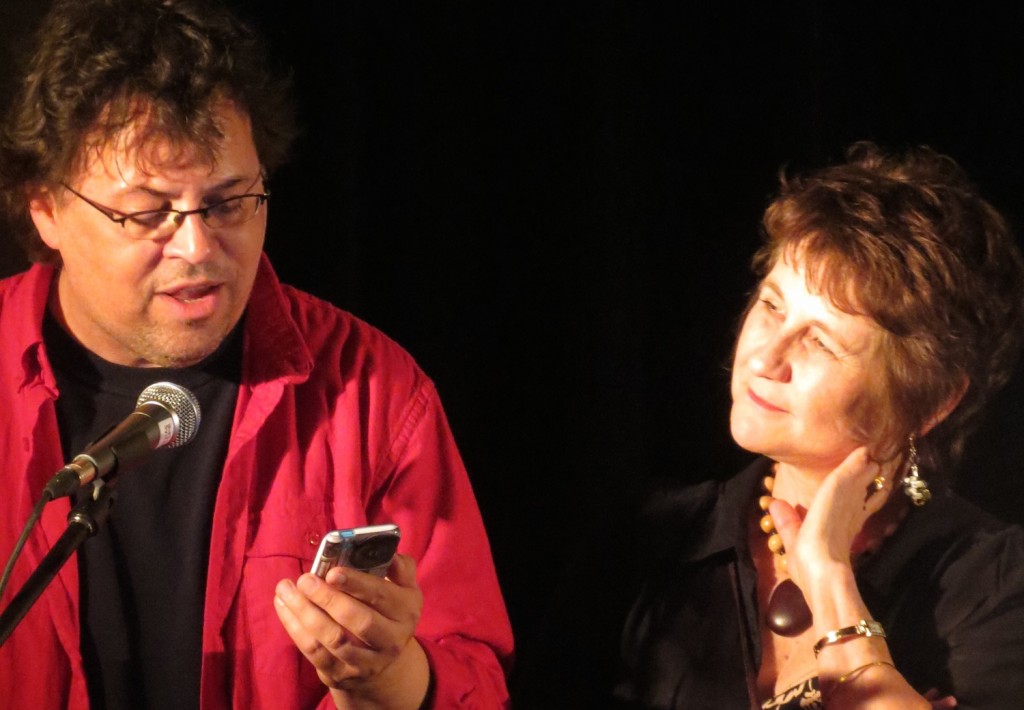
It has been invigorating and soul-filling for me, as both a theatre writer and theatre artist, to have the Magnetic North Theatre Festival in Halifax for the past ten days. I have seen productions that have been provocative and fascinating and challenging, and many have spawned passionate conversations and debates that have spilled out into the theatre lobbies and the Festival Bar at the Atlantica Hotel. For a city and a theatre community that I think sometimes feels isolated from the Canadian Theatre Community as a whole, having an influx of theatre makers from all corners of the country here and being encouraged to meet and mingle is something that I wish could happen in Halifax more often.
For the visiting artists they were treated to mostly unseasonably gorgeous weather in Halifax and enthusiastic and often sold-out crowds. The Compass Points and Industry Programming kept a keen group of artists making the most of every workshop, Keynote speech and Networking opportunity and I found their presence and their energy to be infectious. As with most things, I think the people who benefited the most from the Magnetic North Theatre Festival being in Halifax were the people who chose to involve themselves in as many of the opportunities the Festival provided as they could.
For the first time in its history Magnetic North partnered with a local company in Halifax, Eastern Front Theatre and its annual Stages Festival, melding the two festivals together. At first I thought this was a great idea, mostly because the Halifax Theatre Community, to generalize, often has a reluctance to patronize theatre that comes “from away.” Yet, in my experience almost all the people from the Halifax Theatre Community that I saw attending both the Magnetic North shows and the Stages shows, engaging with the Festival on Social Media and hanging out at the Atlantica afterwards were people involved in some aspect of the Festival or close friends with someone affiliated with the show. This is a common challenge that Halifax faces and it’s frustrating to see an opportunity for uniting theatre artists from disparate cities not attracting many of those who would greatly benefit from it.
One of the challenges facing Halifax-based artists was the timing of Magnetic North. The Eastern Front Stages Festival is usually in May. Because there are almost no opportunities for professional theatre in Halifax in the summer beyond Shakespeare By the Sea, the majority of Halifax’s actors disperse into smaller, rural towns in the rest of Nova Scotia that have theatres with summer seasons, hunkering down there until just before the Atlantic Fringe Festival begins in September. As Francine Deschepper, a performer in 2b Theatre’s When It Rains and Keelin Jack, a performer in The National Elevator Project, proved it wasn’t impossible for those working elsewhere to come into Halifax to both perform and attend Magnetic North Shows, but it required a fair bit of planning, maneuvering and likely exhaustion as well. Both Deschepper and Jack are performing in Daniel MacIvor’s Marion Bridge in Wolfville’s Valley Summer Theatre, which opens July 4. Wolfville is only an hour away from Halifax, but there isn’t a convenient and economic public transportation option like in larger cities, which often leaves artists (who often don’t own cars) stranded in their summer theatre towns for the entire season.
Another challenge of uniting Magnetic North with the Stages Festival is that their mandates, although both committed to fostering new Canadian work, have one significant difference. The Magnetic North Theatre Festival exists to showcase “the best” of Canadian Theatre from across the country. The Stages Festival exists to showcase Atlantic Canadian Theatre at different stages of development. This means that the shows that Magnetic North brought to the Festival were usually indicative of the theatre company who created it. Most of the shows had been developed in other Festivals and/or had runs in other theatres before coming to Halifax. The caliber of theatre here was uniformly highly polished, so as to fit the mandate of “The best of Canadian Theatre.”
For the Stages Festival, which is as much interested in process as product, most of its offerings for Magnetic North were World Premieres. This was extremely exciting as well, as it meant that we were able to see the beautiful Mermaid Theatre’s Stella, Queen of Snow before they toured it around the World and also the brand new Daniel MacIvor and Daniel Brooks collaboration Who Killed Spalding Gray, presumably before they take it on tour across the country. Yet, for a local theatre company that isn’t as well known and doesn’t get to take their work out of Halifax as often, Zuppa Theatre’s show in Magnetic North Pop Up Love Party was, in keeping with Stages’ mandate, very early in their process. They are working towards premiering this show in March, 2015, so this incarnation was very much a launching point for them. It was a fun and theatrical evening to attend and it can be very interesting to connect to a piece of theatre at this stage in the process, especially with a company who devise their work collaboratively. Yet, since Pop Up Love Party was not indicative of Zuppa’s more polished shows, such as their incredible Uncle Oscar’s Experiment, I wondered if it was the ideal choice to put forth as an introduction to the company for an audience of visiting theatre makers.
I loved how Theatre Yes’ The National Elevator Project featured playwrights from New Brunswick, Nova Scotia, Newfoundland and Prince Edward Island, because I feel like Atlantic Canadian Theatre is often marginalized, but that also there is not a strong enough connection between the theatre makers in these four provinces. Ideally it would have been lovely to have representation from theatre companies in New Brunswick, Newfoundland, Prince Edward Island and elsewhere in Nova Scotia, like Cape Breton, for example. Ultimately, I think that it is our responsibility as Atlantic Canadian Theatre Artists to be a little less insular and to work together to further forge and foster relationships with one another and to help the theatre thrive and to be recognized as thriving not only in Halifax, but into the rest of the Maritimes as well. This is one way that Eastern Front Theatre’s presence is essential in Halifax, and I think, not often valued nearly enough.
It has been interesting experiencing the Festival both as an individual theatre writer and someone who is passionate about the Canadian Theatre and as a Haligonian who is passionate about Atlantic Canadian Work. For me, it has further highlighted some challenges faced by the artists who live here that are not just unique to Magnetic North. Yet, it has also cemented my belief that one of the best things that we can do, as those who love Canadian Theatre, is to find ways to come together and to make our sprawling country and its artists feel a little less isolated from one another. The more we learn about each other and from each other the better our theatre will be.









